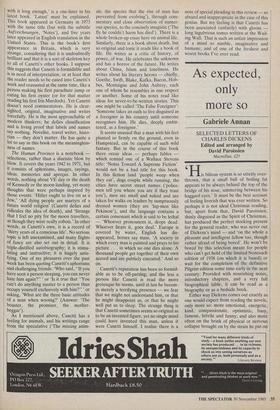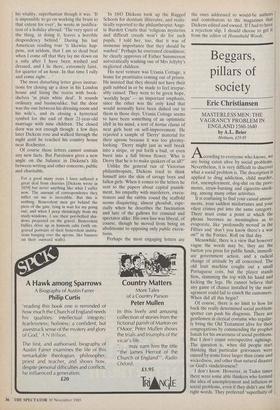As expected, only more so
Gabriele Annan
SELECTED LETTERS OF CH ARLES DICKENS Edited and arranged by David Paroissien Macmillan, £25 is bilious system is so utterly over- thrown, that a small ball of boiling fat appears to be always behind the top of the bridge of his nose, simmering between his haggard eyes.' It must be the best account of feeling liverish that was ever written. So perhaps it is not ideal Christmas reading, but, apart from that, David Paroissien, thinly disguised as the Spirit of Christmas, has produced the perfect stocking present for the general reader, who was never out of Dickens's mind — and 'on the whole a pleasant and intelligent fellow too, though rather afraid of being bored'. He won't be bored by this selection meant for people who can't get hold of the limited Nonesuch edition of 1938 (on which it is based) or wait for the completion of the definitive Pilgrim edition some time early in the next century. Provided with nourishing notes, introductory chapters, and a very full biographical table, it can be read as a biography or as a bedside book. Either way Dickens comes out exactly as one would expect from reading the novels, only more so: more emotional, energetic, kind, compassionate, optimistic, busy, famous, febrile and funny; and also more often on the brink of physical or nervous collapse brought on by the strain he put on his vitality, superhuman though it was. 'It is impossible to go on working the brain to that extent for ever', he wrote in justifica- tion of a holiday abroad. 'The very spirit of the thing, in doing it, leaves a horrible despondency behind.' During his last American reading tour 'it likewise hap- pens, not seldom, that I am so dead beat when I come off that they lay me down on a sofa after I have been washed and dressed, and I lie there, extremely faint, for quarter of an hour. In that time I rally and come right. .
The most disturbing letter gives instruc- tions for closing up a door in his London house and lining the recess with book- shelves In plain white deal'. It sounds ordinary and businesslike: but the door was the one between his dressing room and his wife's, and its closing a hysterical symbol for the end of their 21-year-old marriage with nine children. The closed door was not enough though: a few days later Dickens rose and walked through the night until he reached his country house near Rochester.
Of course these letters cannot contain any new facts. But Paroissien gives a new angle on the balance in Dickens's life between writing and other concerns, public and charitable.
For a good many years I have suffered a great deal from charities [Dickens wrote in 1859] but never anything like what I suffer now. The amount of correspondence they inflict on me is incredible. But this is nothing. Benevolent men get behind the piers of the gate, lying in wait for my going out; and when I peep shrinkingly from my study-windows, I see their pot-bellied sha- dows projected on the gravel. Benevolent bullies drive up in hansom cabs (with en- graved portraits of their benevolent institu- tions hanging over the aprons, like banners on their outward walls).
In 1843 Dickens took up the Ragged Schools for destitute illiterates, and realis- tically reported to the philanthropist Ange- la Burdett Coutts that 'religious mysteries and difficult creeds won't do for such pupils. I told her, too, that it was of immense importance that they should be washed.' Perhaps he overrated cleanliness; he clearly approves of Esther Sum merson autocratically washing one of Mrs Jellyby's neglected children.
His next venture was Urania Cottage, a home for prostitutes coming out of prison. He insisted that they should not have their guilt rubbed in or be made to feel irrepar- ably ruined. They were to be given hope, 'worldly hope' — an important emphasis, since the other was the only kind that would normally have been dished out to them in those days. Urania Cottage seems to have been something of an optimistic idyll in his mind, a sort of hortus clusus of neat girls bent on self-improvement. He rejected a sample of 'Derry' material for their aprons because it was too gloomy- looking. 'Derry might just as well break into a stripe, or put forth a bud, or even burst into a full blown flower. Who is Derry that he is to make quakers of us all?'
Unlike the general run of Victorian philanthropists, Dickens tried to think himself into the skin of savage boys and fallen girls. When it comes to the letters he sent to the papers about capital punish- ment, his empathy with murderers, execu- tioners and the rabble round the scaffold seems disquieting, almost ghoulish, espe- cially when he describes the fascination and lure of the gallows for criminal and spectator alike. His own line was liberal, of course, though he moved from being an abolitionist to opposing only public execu- tions.
Perhaps the most engaging letters are
the ones addressed to would-be authors and contributors to the magazines that Dickens edited and owned. If I had to have a rejection slip, I should choose to get it from the editor of Household Words.



























































 Previous page
Previous page